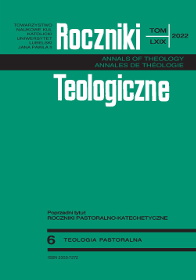Secularism as a Challenge for the Catholic Church in the United States of America in the 21st Century
Abstract
Secularism is a founding principle of the United States of America. Historically, Americans have viewed secularism as a means to protect freedom of religion for its citizenry from a state imposed religion or, conversely, state imposed agnosticism. The American Catholic Church in the 21st century respects the separation of Church and State because it upholds the principle of religious freedom. Contemporary aggressive secularism becomes a challenge for the Church as it increasingly hinders the realization of her mission in the world. Secularism is also a challenge for pastoral theology, whose task is to create models of pastoral activity adapted to the conditions of a specific place and time. Thus, the problem of this study can be expressed in the following question: what is the perception of secularism in the United States, what challenges does it present for the Catholic Church in the 21st Century and how is the Church to fulfill her mission in American society? The answer will be established through analysis of universal Church documents, presentation of the teaching of the Church in the United States and review of the publications of American theologians and sociologists.
This article reviews the historical, cultural and ecclesiastical understanding of secularism in the United States as an ideology, and compares it to the modern understanding of secularism as it pertains to the organization of American society. Furthermore, it evaluates the impact of secularism as ideology and overarching societal organization on the modern American Catholic Church, the Church's role and impact in American society and the Church's vital and moral need to maintain its relevance through evangelization and ongoing participation in social justice issues in American society despite its minority status and the impact of recent scandals.
References
Aee, Gary B. “Racial Equality, Catholicism, and the Third Colored Catholic Congress,” Pennsylvania Legacies 15(2015), 2: 18−25.
Casanova, José. “The Secular and Secularisms,” Social Research 76(2009), 4: 1049−66.
Frey, Jennifer A. “Like Amy Coney Barrett, I'm a professional woman criticized form my big, Catholic Family.” USA Today. Published Oct 15, 2020. USAToday.com
Hunt, Mary E. “Women-Church: Feminist Concept, Religious Commitment, Women's Movement,” Journal of Feminist Studies in Religion 25(2009), 1: 85−98.
Inglehart, Ronald, and Wayne E. Baker. “Modernization, Cultural Change, and the Persistence of Traditional Values,” American Sociological Review 65(2000), 1: 19−51.
Montefiore, Hugh. Reclaiming the High Ground: A Christian Response to Secularism. Palgrave: Macmillan UK, London: Borough of Camden, 1990.
Pope Benedict XVI. “A time for Christians to engage with the world.” Vatican.va, 2012. Accessed February 19, 2021. http://www.vatican.va/content/benedict-xvi/en/speeches/2012/december/documents/hf_ben-xvi_spe_20121220_financihttpal-times.html.
Pope Francis. “Apostolic Constitution Episcopalis Communio.” Vatican.va, 2018. Accessed February 20, 2021. http://www.vatican.va/content/francesco/en/apost_constitutions/documents/papa-francesco_costituzione-ap_20180915_episcopalis-communio.html.
Requena, Federico M. “The Impact of the Second Vatican Council on United States Catholic Historiography.” U.S. Catholic Historian 33(2015), 2: 103−32.
Scribner, Todd. A partisan Church: American Catholicism and the rise of neoconservative Catholics. Washington, DC: Catholic University of America Press, 2015.
Spitzer, Robert J. “Confronting Secularism Today.” United States Conference for Catholic Bishops, 2021. Accessed February 23, 2021. https://www.usccb.org/beliefs-and-teachings/how-we-teach/catechesis/catechetical-sunday/enlisting-witnesses/confronting-secularism-today.
Święs, Kazimierz. “Sekularyzacja.” In Leksykon teologii pastoralnej, edited by Ryszard Kamiński, Wiesław Przygoda, Marek Fiałkowski, 785−88. Lublin: Towarzystwo Naukowe KUL, 2006.
Williams, Shannen Dee. “The Global Catholic Church and the Radical Possibilities of #BlackLivesMatter.” Journal of Africana Religions 3(2015), 4: 503−15.
Zagacki, Kenneth S. “Pope John Paul II and the Crusade against Communism: A Case Study in Secular and Sacred Time,” Rhetoric and Public Affairs 4(2001), 4: 689−710.
Copyright (c) 2022 Roczniki Teologiczne

This work is licensed under a Creative Commons Attribution-NonCommercial-NoDerivatives 4.0 International License.





